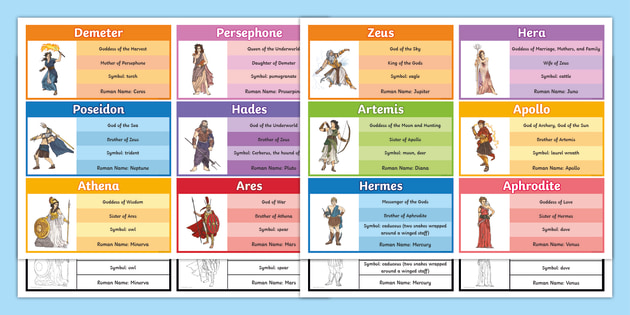

The Greeks also believed that after people died, they went to the Underworld (like the Ancient Egyptians).

These would often show up in mythology too. In addition to gods, the Greeks believed in mythical creatures such as centaurs (half human, half horse) and Cyclopes (monsters with only one eye).Because the gods had their own personalities, stories about them were told to explain why they acted the way they did – this is called mythology.They could be just as mean to each other as they could be to mortals, which made it more difficult to know how to keep them happy. The gods and goddesses weren’t always very nice.There were 12 main gods and goddesses, and they all lived on Mount Olympus – the highest mountain in Greece.The Greek gods were humans who looked like you and I do, but they were immortal (they could live forever) and had special powers.Zeus was king of all the gods, and he controlled the weather. The Olympics began as a sporting festival held to honour the god Zeus.To please the gods even more, festivals were held in their honour.Priests in the temples were in charge of speaking to their particular god or goddess, and making sense of what they wanted the Greek people to do. The Ancient Greeks were very religious people, and believed that many different gods controlled everything that happened in life.The Greeks told many stories about things that the gods did – this is called mythology. The Greeks would also hold festivals for the gods, and sporting events like the Olympics. Priests were in charge of the temples and letting everyone know what the gods were trying to tell them. The gods and goddesses looked like humans, but they lived forever.Īs a way to keep the gods and goddesses happy, the Greeks built a temple for each one. The Ancient Greeks believed that everything in life was controlled by a god or goddess – so, if the crops didn’t grow very well one year, they thought it was because the goddess of the harvest (Demeter) wasn’t happy.


 0 kommentar(er)
0 kommentar(er)
